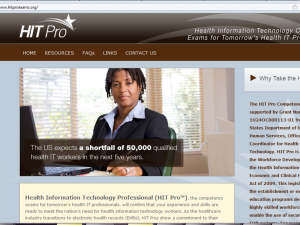Federals at HIMSS12 Annual Conference & Exhibition
February 20-24, 2012 · Las Vegas, NV
Accessed and excerpted from HealthIT.gov on Feb 18, 2012
Representatives from ONC, Centers for Medicare & Medicaid Services (CMS), Office for Civil Rights (OCR), and other Federal agencies will be at HIMSS to share information about their health IT initiatives. Below are highlights from the HIMSS schedule of events. For a complete list of participating Federal agencies and their educational sessions, visit the Federal section of the HIMSS12 website.
HIMSS Schedule of Events
| Time | Location | Event |
|---|---|---|
| Monday, February 20, 2012 | ||
| 8:45-9:30 a.m. | Lando 4204 | HIE Symposium – Opening Keynote HIE: The Next Generation and Beyond Doug Fridsma, Director, Office of Standards and Interoperability |
| 9:30-10:30 a.m. | Lando 4204 | HIE Symposium – Inter Agency Collaboration: A Federal Update John Allison, Health Insurance Specialist Claudia Williams, Director, State HIE Program |
| 10:45-11:45 a.m. | Lando 4204 | HIE Symposium – State Collaborations: Current Trends and Future Directions Lee Stevens, Program Manager, State HIE Program |
| 11 a.m.-12 p.m. | San Paolo 3504 | Physicians’ IT Symposium – Optimizing Your EHR Value Through Patient Engagement Judy Murphy, RN, Deputy National Coordinator |
| 12:45-1:45 p.m. | Lando 4204 | HIE Symposium – SLHIE: Moving from Planning to Implementation Jessica Kahn, Technical Director for Health IT Claudia Williams, Director, State HIE Program |
| 1-2 p.m. | Veronese 2506 | Achieving Meaningful Use Symposium – CMS and ONC Present Stage 2 Essential Knowledge Robert Anthony, Policy Analyst, CMS Steven Posnack, Director, Federal Policy Division, ONC |
| 1:30-2:30 p.m. | Veronese 2406 | Performance Measurement and CDS Symposium: Leveraging CDS at the Point of Care to Optimize Quality Measure Outcomes Jacob Reider, MD, ONC Senior Policy Advisor |
| Tuesday, February 21, 2012 | ||
| 9:45-10:45 a.m. | Casanova 503 | Health IT Update from HRSA Yael Harris, PhD, MHS, Director, Office of Health IT & Quality |
| 9:45-10:45 a.m. | Lando 4303 | Stage 2 Meaningful Use Elizabeth Holland, Director, HIT Initiatives Group Jessica Kahn, Technical Director for Health IT |
| 9:45-10:45 a.m. | Galileo 1001 | Direct Project Panel Discussion Moderator: Doug Fridsma, Director, Office of Standards and Interoperability |
| 9:45-10:45 a.m. | TBD | HIE National Landscape, Monitoring States Momentum Moderator: Lee Stevens, Program Manager, State HIE Program |
| 11:00 a.m.-12:00 p.m. | Casanova 503 | CDC and Meaningful Use: Strengthening the Link Between Healthcare Providers and Public Health Seth Foldy, MD, MPH, FAAFP, Senior Advisor, Public Health Surveillance & Informatics Program Office |
| 11:00 a.m.-12:00 p.m. | Lando 4303 | ONC Consumer Outreach/Pledge Initiative Lygeia Ricciardi, Senior Policy Advisor for Consumer e-Health |
| 11:00 a.m.-12:00 p.m. | San Polo 3503 | Medicare and Medicaid EHR Incentive Programs: Meaningful Use Stage 1 Overview Travis Broome, Policy Analyst Elizabeth Holland, Director, HIT Initiatives Group Jessica Kahn, Technical Director for Health IT Robert Anthony, Policy Analyst |
| 12:15-1:15 p.m. | San Polo 3503 | Redefining Health Care: Advancing Patient-Centered Care Through Health IT Carolyn Clancy, MD, Director of AHRQ |
| Wednesday, February 22, 2012 | ||
| 8:30-9:30 a.m. | San Polo 3503 | ONC Certification Programs – Update and Next Steps Doug Fridsma, Director, Office of Standards and Interoperability Steve Posnack, Director, Federal Policy Division Carol Bean, Director, Certification Division |
| 9:45-10:45 a.m. | San Polo 3503 | Stage 2 Meaningful Use: An Introduction Travis Broome, Policy Analyst, CMS Elizabeth Holland, Director, HIT Initiatives Group, CMS Steve Posnack, Director, Federal Policy Division, ONC Farzad Mostashari, MD, ScM, National Coordinator for Health Information Technology |
| 1-2 p.m. | Casanova 503 | Update on HIPAA Initiatives David Sayen, Regional Administrator, CMS Elizabeth Reed, Health Insurance Specialist, CMS |
| 2:15-3:45 p.m. | San Polo 3503 | ONC Townhall: Advancing Health IT Into the Future Farzad Mostashari, MD, ScM, National Coordinator for Health Information Technology |
| Thursday, February 23, 2012 | ||
| 8:30-9:30 a.m. | Palazzo Ballroom | Keynote speaker Farzad Mostashari, MD, ScM, National Coordinator for Health Information Technology |
| 9:45-10:45 a.m. | San Polo 3503 | Privacy and Security – You Can Do It and Here’s How Joy Pritts, Chief Privacy Officer, ONC |
| 9:45-10:45 a.m. | Venetian Showroom | Medicare and Medicaid EHR Incentive Programs: Stage 2 NPRM Overview Travis Broome, Policy Analyst, CMS Elizabeth Holland, Director, HIT Initiatives Group, CMS Jessica Kahn, Technical Director for Health IT, CMS Robert Anthony, Policy Analyst, CMS |
| 1-2 p.m. | TBD | RECs: Accelerating Meaningful Use Kimberly Lynch, Director of the REC Program |
| 1-2 p.m. | Lido 3106 | Stage 2: Exchange of Information and Public Health Objectives Jessica Kahn, Technical Director for Health IT, CMS Robert Anthony, Policy Analyst, CMS Steven Posnack, Director, Federal Policy Division, ONC |
| 1-2 p.m. | Murano 3306 | Consumer E-Technology in Action: Four Implementation Examples from Beacon Communities Korey Capozza, Utah Beacon Drew McNicol, Western New York Beacon Alan Snell, MD, Indiana Beacon Barbara Sorondo, Maine Beacon |
| 2:15-3:15 p.m. | Marco Polo 705 | IOM Study-Patient Safety Jacob Reider, MD, ONC Senior Policy Advisor |
| 2:15-4:15 p.m. | San Polo 3503 | Stage 2: Clinical Quality Measures Travis Broome, Policy Analyst, CMS Steve Posnack, Director, Federal Policy Division, ONC |
| Friday, February 24, 2012 | ||
| 10:00-11:00 a.m. | San Polo 3503 | HIPAA Privacy and Security Regulations Leon Rodriguez, Director of OCR |
| 11:15 a.m.-12:15 p.m. | Venetian Showroom | Stage 2: Payment Adjustments and Changes from Stage 1 Travis Broome, Policy Analyst, CMS Robert Anthony, Policy Analyst, CMS |
Theater Booth Sessions – Exhibit Hall, Booths 14624/14824
CMS and ONC will be presenting on special topics in health IT and meaningful use at the theater booth in the HIMSS exhibit hall.
| Time | Presentation Topic |
|---|---|
| Tuesday, February 21, 2012 | |
| 1:30-2:15 p.m. | Workforce: The Use of Immersive Learning Environments in Online HIT Technology |
| 3:00-3:30 p.m. | Medicaid Patient Volume |
| 4:00-5:45 p.m. | Beacon Communities: Bringing HITECH to Life – Beacon Project Highlights – IT-Enabled Care Coordination, HIT Infrastructure to Support Pioneer ACOs, and Mobile Technology in Support of Better Diabetes Management |
| Wednesday, February 22, 2012 | |
| 9:45-10:30 a.m. | Query Health: Demonstrating How to Send Questions to the Data |
| 11:00-11:30 a.m. | Overview and Timeline for Incentives and Payment Adjustments |
| 12:00-12:45 p.m. | NwHN Exchange Opportunities and the Path Forward |
| 2:45-3:30 p.m. | AHRQ: Model Children’s EHR Format |
| 4:00-4:30 p.m. | FAQs on Stage 1 Meaningful Use |
| 5:00-5:45 p.m. | The popHealth Challenge Demonstration: Patient Engagement Reminders for popHealth Measures |
| Thursday, February 23, 2012 | |
| 10:00-10:30 a.m. | How States Are Auditing the Medicaid EHR Incentive Programs |
| 11:30 a.m.-12:00 p.m. | Overview of Stage 2 Meaningful Use |
| 3:00-3:45 p.m. | Privacy & Security: Privacy Protection for Substance Abuse Treatment Information |
| 4:00-4:45 p.m. | Workforce: Using the ONC-HIT Teaching Materials |
ONC “Talk to the Expert” Sessions – Exhibit Booth #14824
ONC will be hosting “Talk to the Expert” sessions at its exhibit booth. Stop by to learn about:
- ONC resources
- Certification and Standards/Interoperability
- ONC’s Regional Extension Centers, Beacon, and Workforce programs.
Engage with ONC during the Conference Online
During HIMSS, ONC will be engaging people online through its social media properties by:
- Hosting discussions on LinkedIn
- Tweeting live from the event
- Loading all of their handouts from the conference on Scribd
If you are not already a member of our LinkedIn group, or following us on Twitter (@ONC_HealthIT), sign up today to join the discussion!
Don’t forget to check out Scribd to download handouts from HIMSS!




